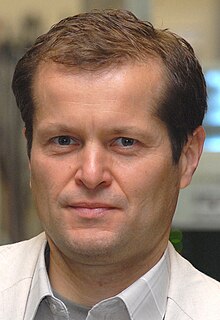Ferenc Krausz
Ferenc Krausz | |
|---|---|
 Krausz in 2007 | |
| Born | 17 May 1962 |
| Education | |
| Known for | First attosecond light source |
| Awards | Wolf Prize in Physics (2022) BBVA Foundation Frontiers of Knowledge Award (2022) Nobel Prize in Physics (2023) |
| Scientific career | |
| Fields | Attosecond physics |
| Institutions | |
| Thesis | Erzeugung ultrakurzer Lichtimpulse in Neodymium-Glaslasern (1991) |
| Doctoral advisor | Arnold Schmidt[1] |
| Website | https://attoworld.de/ |
Ferenc Krausz (born 17 May 1962[2]) is a Hungarian physicist working in attosecond science. He is a director at the Max Planck Institute of Quantum Optics and a professor of experimental physics at the Ludwig Maximilian University of Munich in Germany. His research team has generated and measured the first attosecond light pulse and used it for capturing electrons' motion inside atoms, marking the birth of attophysics.[2] In 2023, jointly with Pierre Agostini and Anne L'Huillier, he was awarded the Nobel Prize in Physics.
Academic career
[edit]From 1981 until 1985 Krausz studied theoretical physics at Eötvös Loránd University and electrical engineering at the Technical University of Budapest in Hungary.[3] From 1987 to 1991 he graduated with a PhD at the Technical University of Vienna, in Austria,[3][4] and from 1991 to 1993 he also did his habilitation there.[3] 1996–1998 he became associate professor,[3] from 1999 until 2004 professor of electrical engineering at the same institute.[3]
In 2003 he was appointed director at the Max Planck Institute for Quantum Optics in Garching,[5] and in 2004 became chair of experimental physics at the Ludwig Maximilian University of Munich.[3]
Honors and awards
[edit]- 2006 - Gottfried Wilhelm Leibniz Prize[6]
- 2006 – Royal Photographic Society Progress medal and Honorary Fellowship[7]
- 2009 – elected a Fellow of Optica[8][4]
- 2013 – Otto Hahn Prize[5]
- 2015 – selected Clarivate Citation laureate in Physics with Paul Corkum "for contributions to the development of attosecond physics."[9]
- 2016 – Member of the German Academy of Sciences Leopoldina.[10]
- 2019 – Vladilen Letokhov Medal.[11]
- 2022 – Wolf Prize in Physics with Anne L'Huillier and Corkum for "for pioneering contributions to ultrafast laser science and attosecond physics".[3]
- 2022 – BBVA Foundation Frontiers of Knowledge Award in Basic Sciences with L'Huillier and Corkum.[12]
- 2023 – Nobel Prize in Physics with L'Huillier and Pierre Agostini for "for experimental methods that generate attosecond pulses of light for the study of electron dynamics in matter."[2]
References
[edit]- ^ "Das sagt Ferenc Krausz zum Nobelpreis". vienna.at. 3 October 2023. Retrieved 6 October 2023.
- ^ a b c "The Nobel Prize in Physics 2023". NobelPrize.org. Retrieved 21 November 2023.
- ^ a b c d e f g מיכל (8 February 2022). "Ferenc Krausz". Wolf Foundation. Retrieved 21 November 2023.
- ^ a b "Three Optica Fellows awarded 2023 Nobel Prize in Physics for experimental methods enabling attosecond physics | Optica". www.optica.org. Retrieved 6 November 2023.
- ^ a b "Otto Hahn Prize for Ferenc Krausz". www.mpq.mpg.de. Retrieved 21 November 2023.
- ^ "Leibniz Prize". www.lmu.de. Retrieved 11 January 2024.
- ^ "Progress Medal". Royal Photographic Society. Retrieved 21 November 2023.
- ^ "2009 Fellows Optica". www.optica.org. Retrieved 6 November 2023.
- ^ "Thomson Reuters Forecasts Nobel Prize Winners". www.prnewswire.com (Press release). Reuters. Retrieved 4 October 2023.
- ^ "Ferenc 2023 -Nobel Prize in Physics Krausz". German Academy of Sciences Leopoldina. Archived from the original on 8 March 2022. Retrieved 26 May 2021.
- ^ "The first 2019 Vladilen Letokhov Medal goes to Ferenc Krausz". European Physical Society. Archived from the original on 17 April 2022.
- ^ "The Frontiers of Knowledge Award goes to Anne L'Huillier, Paul Corkum and Ferenc Krausz for enabling subatomic particles to be observed in motion over the shortest time scale captured by science". Premios Fronteras. 22 February 2023. Retrieved 21 November 2023.
External links
[edit]- Ferenc Krausz on Nobelprize.org
- Portrait at the Deutsche Forschungsgesellschaft Archived 3 December 2013 at the Wayback Machine
- Homepage of Ferenc Krausz Archived 14 April 2016 at the Wayback Machine
- Homepage of the group of Ferenc Krausz
- Munich-Center for Advanced Photonics
- 1962 births
- 20th-century Hungarian physicists
- Academic staff of the Ludwig Maximilian University of Munich
- Academic staff of TU Wien
- Foreign members of the Russian Academy of Sciences
- Gottfried Wilhelm Leibniz Prize winners
- Hungarian expatriates in Germany
- Hungarian Nobel laureates
- Hungarian nuclear physicists
- Living people
- Max Planck Institute directors
- Members of the German National Academy of Sciences Leopoldina
- People from Mór
- Nobel laureates in Physics
- Science teachers
- Theoretical physicists
- TU Wien alumni

